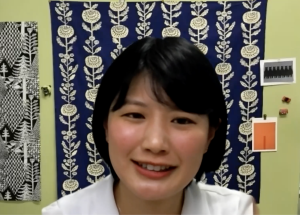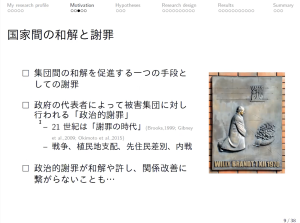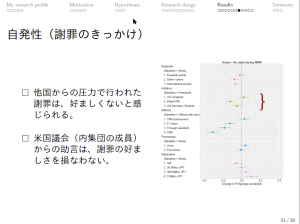Crafting International Apologies that Work: A Conjoint Analysis Approach
日時: 6月10日(木) 14:45~16:15
場所: Zoomでのオンライン開催
話者: 小濱祥子 (北海道大学法学研究科・准教授)
共著者:稲増一憲(関西学院大学)、大坪庸介(東京大学)、日道俊之(高知工科大学)、三船恒裕(高知工科大学)、多湖淳(早稲田大学)
参加者:25名
タイトル:Crafting International Apologies that Work: A Conjoint Analysis Approach


アブストラクト:
What can political leaders do to appease a foreign public’s anger and resentment when their country, intentionally or accidentally, caused harm to another country? Scholars have found that apologies by political leaders, if carefully crafted, can promote reconciliation between the perpetrator’s country and the citizens of the victimized country. However, few quantitative studies have investigated how victims weight the different elements of a political apology when deciding whether to forgive the perpetrator. This gap limits our understanding of this important policy tool in international relations and our ability to make policy recommendations. Accordingly, this research conducts survey experiments with a conjoint design, using a sample of Japanese nationals and scenarios depicting US presidential apologies to Japan. Our analysis demonstrated three key attributes of an effective international apology: the reparation amount, the voluntariness of an apology initiative, and the irrevocability of the apology. It finds that people preferred apologies coupled with a larger amount of reparation, unless the perceived harm was to sacred values. Apologies conveyed through official channels and on the initiative of the political leader of the perpetrator’s country were more likely to be accepted. Thus, apologies incurring costs and demonstrating commitment are more effective, although the optimal form of apology also depends on the issue at stake.

